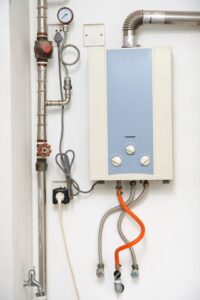
The water that comes from the tap is essential to our daily lives. You drink it, cook with it, use it to bathe, and wash dishes and your clothes in it. However, not all water is the same. Depending on where you live and your water source, it can be filled with different levels of various minerals– making it “hard.” That’s where water softener comes in.
In this article, we will lay out the differences between hard and soft water, discuss how a water softener works, and let you know when it’s time to get some for your house.
What Is Hard and Soft Water?
As we mentioned above, hard water is water that contains various minerals inside of it– namely, calcium, magnesium, and trace amounts of other minerals. While this doesn’t pose any real health concerns, it can cause problems in other ways. That’s because these minerals can build up as the water flows in and out of your home. We’ll discuss more what issues hard water causes down below.
Now, we’re sure you’ve already figured out what soft water is, but it’s simply water that’s been stripped of all the extra minerals and is pure H2O. In general, softer water is better than hard water for your home and body.
How Do Water Softeners Work?
A water softener uses a tank that’s installed where the water enters your home. It comes in through the filtration system, and the filter removes the magnesium and calcium from the water before sending it to the rest of the house.
Inside the tank are resin beads that were specifically formulated with positively charged ions to remove the negative ions of magnesium and calcium. It basically works like two magnets that pull and stick to each other.
Why Do I Need A Water Softener?
As the minerals build up, they can cause a number of issues for you and your home. Here are the top three signs it’s time to get a water softener in New Hope, PA:
1) Dry Hair and Dry Skin
As we said, hard water isn’t hazardous but it can throw off the hydration levels and pH of your skin and hair. If you’re needing to use more lotions and cream to not feel itchy and dry after a shower, then it could be a sign your water is hard.
2) Limescale Buildup
If you’re starting to see white, chalky stuff build up around the faucets in your house, then it’s likely limescale buildup. It’s not only ugly, but it can affect the way the water flows and buildup in the pipes can cause clogs and damage to the water-supply system. It also accumulates on your pots, pans, plates, cups, and other items in your kitchen.
3) Stains You Can See
A lot of times, you will notice stains in sinks, bathtubs, and other places the water flows. You can clean it with vinegar and other items, but that only works for a limited time. Eventually, the stain will return.

